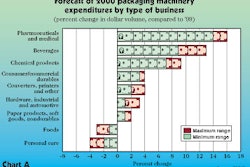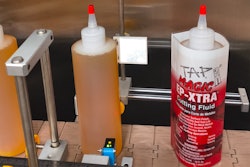That’s according to CIT Equipment Financing’s (Livingston, NJ) 10th Annual Plastics Industry Outlook. The outlook predicts shipments by plastics processors to increase 4.5% this year, 3% next year and 3.5% in 2002 to $145 billion. The U.S. trade surplus in plastic products, the report suggests, will reach $12 billion in ’02, a 20% increase above 1999. CIT’s study did not include any specific packaging-related information, Packaging World learned.
On the machinery side, the Outlook predicts that U.S. plastics equipment purchases will rise 4% this year to $3 billion, reaching $3.3 billion in two years.
Optimism with caution
Despite the optimistic figures, the report cites concerns, some of which were expressed by Michael Paslawskyj, CIT’s vice president of economic research. “Although an increase in the cost of resin due to higher oil prices and a diversion of funds for emission reductions are key challenges, the most serious problem that the industry faces is productivity,” he explains. “What we’re talking about is the gap that exists between productivity growth in the plastics processing industry and manufacturing as a whole. Too much cheap labor [instead of] automation on shop floors is the culprit.
“If the industry is going to hold its own with the rest of the manufacturing world in terms of productivity, it must increase its use of robotics and computers,” he adds.
CIT is a commercial and consumer finance organization that offers outlooks for various industries, including plastics, packaging and paper.


























